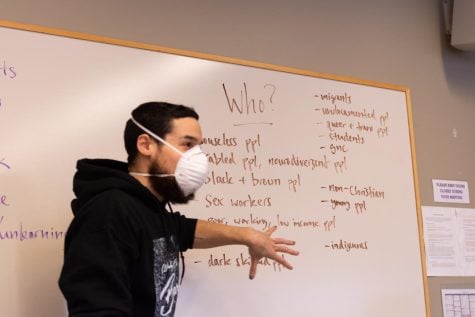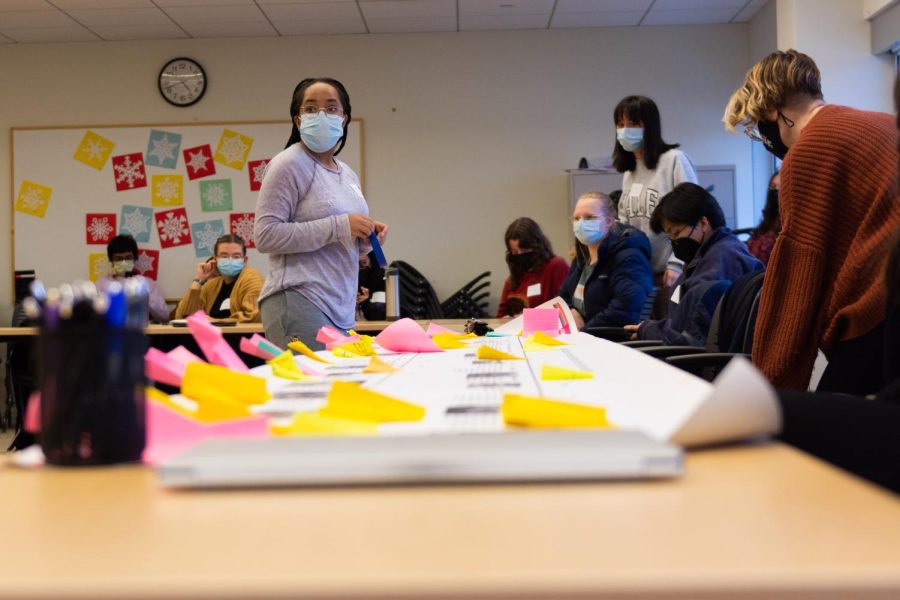Benji Hart discusses queer perspectives on policing and imprisonment abolition at Black History Month event
Kaavya Butaney/The Daily Northwestern
As part of the workshop, Benji Hart presented a timeline of queer and trans history in Chicago from 1836 to 2019.
February 8, 2023
Freelance educator Benji Hart spoke about police and imprisonment abolition through a queer lens Wednesday as part of the Women’s Center’s quarterly trans programming and Black History Month.
“Having this type of conversation at Northwestern is something that I’ve always wanted to do, and (I want to) just start getting the ball rolling on some of these conversations,” said melisa stephen, event organizer and Women’s Center program manager.
Hart, an artist and author, is also an educator of Black radicalism, queer liberation and prison abolition.
At the beginning of the workshop, Hart set community guidelines for speaking and told attendees to use “I” statements and respect others’ experiences.
“When we are using the term policing, we are talking about a massive network of systems and structures that is not limited to any one nation-state and targets the same groups of people wherever it is operating,” Hart said.
Hart spoke with participants throughout most of the workshop and asked questions about how, who and why certain people are targeted by the police.
They said the majority of people are targeted by police, including Black and brown people, Indigenous people, unhoused people and non-Christians, which means the institution was never created to protect most people.
“When we talk about abolition, we are not talking about some radical idea,” Hart said. “We are talking about poor and working-class (people) getting the same treatment (that) rich people get. We are talking about Black and brown people getting the same response to their crises as white people get.”
Hart then discussed how police use stop-and-frisk methods and the war on drugs as excuses to imprison marginalized people. They highlighted quality-of-life crimes, which they said criminalize people for being poor and punish everyone that breaks the peace of middle-class life.
Many participants verbally agreed with the premise that the policing system exists to uphold white supremacy, the patriarchy and the upper class. Women’s Center Associate Director Njoki Kamau said she specifically noticed how those systems continue to stay in power, no matter what people try to do.

“I couldn’t watch the Tyre (Nichols) video,” she said. “I feel traumatized by the violence over time … it’s so clear why it’s not changing, it doesn’t matter what we do, and until we defund the police or capitalism collapses.”
After discussing the methodology of over-policing, Hart introduced a timeline of queer and trans police resistance with an emphasis on Chicago-based efforts. The timeline begins with Mary Jones — the first documented Black trans person arrested for sex work — and ends in 2019.
Hart gave participants Post-its to put new history or personal anecdotes on the timeline, which they have been asking participants to add to since 2019. However, due to the COVID-19 pandemic, many people never had the chance to contribute.
“There’s a lot of things that have been left out of that (mainstream) narrative,” Schnaude Dorizan said. “That includes a lot of the Black and brown queer and trans events … a lot of that has been left out of Black history, and it is Black history.
The timeline, Hart said, shows how while laws can change, the same groups are targeted by police.
After some participants contributed to the timeline, Hart invited them to offer further steps toward police abolition. Participants mentioned relying on their community, mutual aid and reinvesting in social programs and education as potential solutions.
“Folks who have access to these very privileged institutions that are very much a part of maintaining a lot of these systems and structures that we’re talking about … (should) think about how they can leverage their power to raise these demands,” Hart told The Daily.
Email: kaavyabutaney2026@u.northwestern.edu
Twitter: @kaavya_butaney
Related Stories:
— Black History Month events to catch all over campus
— Princeton graduate student talks anti-caste futures for RCCP



